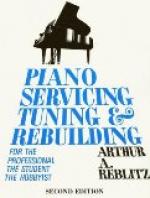One thing you should know is, that organs are not tempered as finely as pianos, nor is there the pains taken to secure perfect unisons. In fact, you can hardly find a perfect unison in an organ of modern make, much less, a correct temperament. Finding a tone that is so far out as to be very disagreeable, adjust it between the octave below and the octave above, try it in the proper chords and equalize it in the best possible way; but it is not often you will be able to tune it to absolute precision with its octaves. It is thought by many that a slight deviation from correct unisons, sufficient to give a series of waves, gives the organ a more mellow voice and consequently a more musical (?) tone; and while we do not agree with any such proposition, it makes the tuner’s work less exacting.
We feel that an apology is in order for not giving illustrations of the action of the organ, but if the student will study this lesson in connection with the instrument itself, we believe he will have no trouble in learning all about its mechanical action and its demands upon the tuner.
QUESTIONS ON LESSON XVI.
1. Name the musical advantages
possessed by the organ which are
absent in the piano.
2. Name the musical advantages
possessed by the piano which are
absent in the organ.
3. Describe the mechanical
operations taking place in the organ
when a key is being sounded.
4. State what you would
do to flatten the tone of a reed and give
reasons.
5. State what you would
do to sharpen the tone of a reed and give
reasons.
LESSON XVII.
CONCLUDING PROFESSIONAL HINTS.
Peculiar incidents occur in the experience of the piano tuner, some of which have come under the observation of the author so frequently that he deems it advisable to mention them here; there are incidents also that happen once in a life-time which must be treated in their time with tact and good judgment, and which it is impossible to describe here, as each tuner, in his special field, will elicit new developments. Occasion often requires the tuner to summon all his wits and tact in order to dispose of questions put to him, both by pianos and owners.
Among the perplexing things that come to the tuner are the terms used by musicians and piano owners to express certain qualities of tone and certain discrepancies of the instrument. We will define a number of these.
Brilliant.—The sense in which this term is used is astonishing to one who is accustomed to using words according to their dictionary meanings. We have heard persons say their piano was too brilliant; or, that it was not brilliant enough. They mean this term to apply to what we are pleased to call the voice of the instrument. When the hammers are hard, producing a sharp, penetrating tone, they




